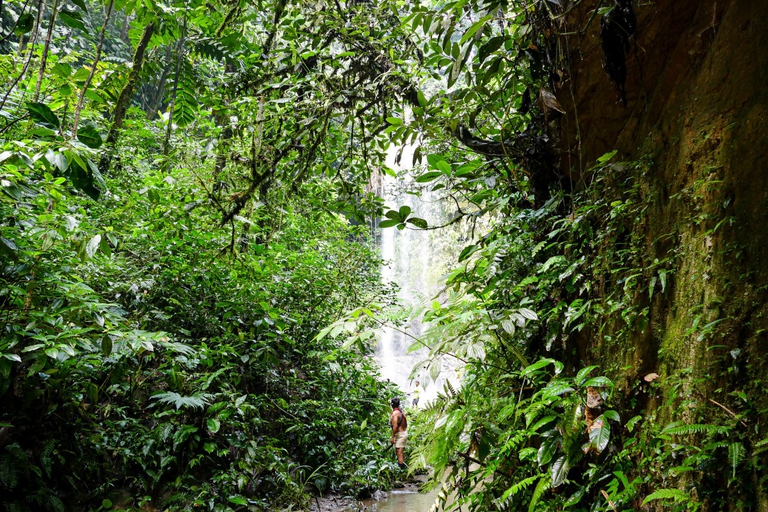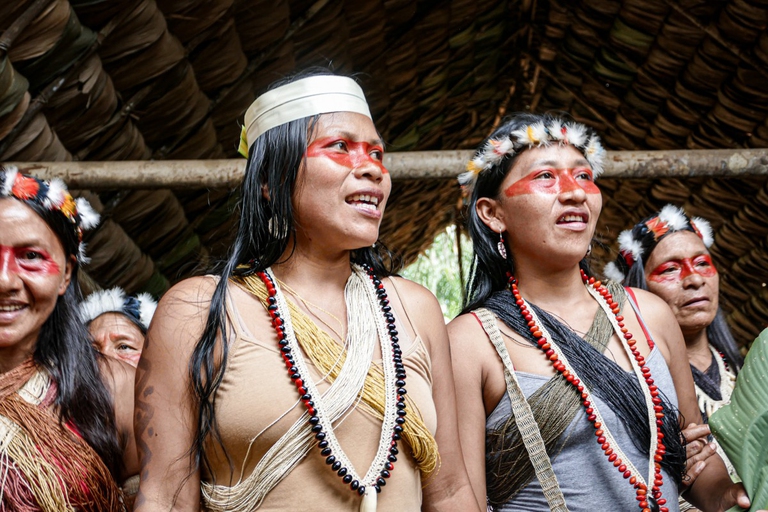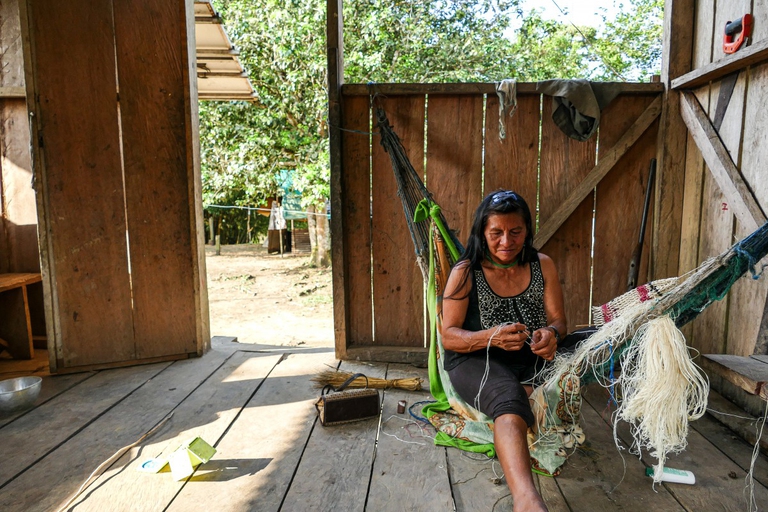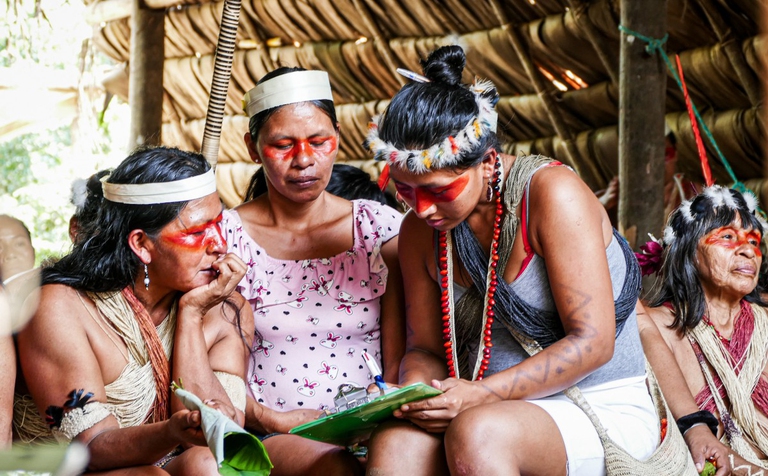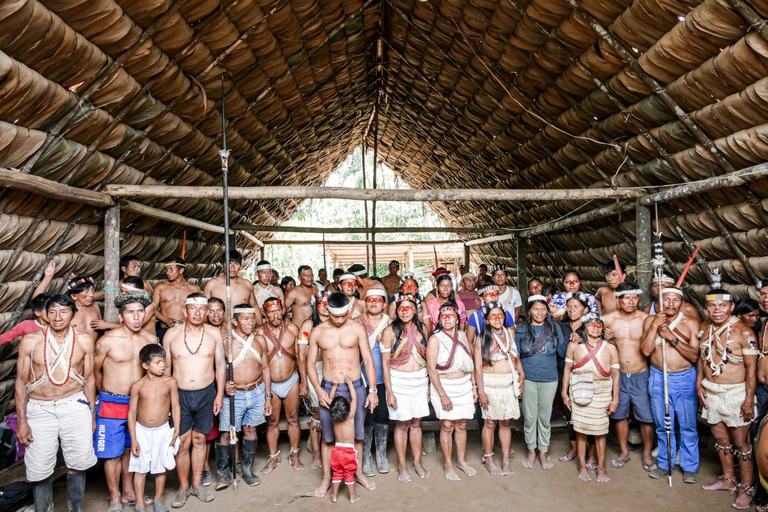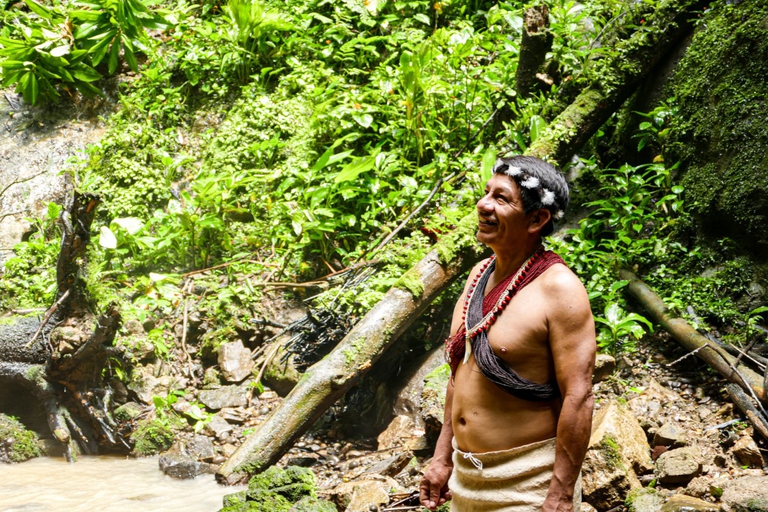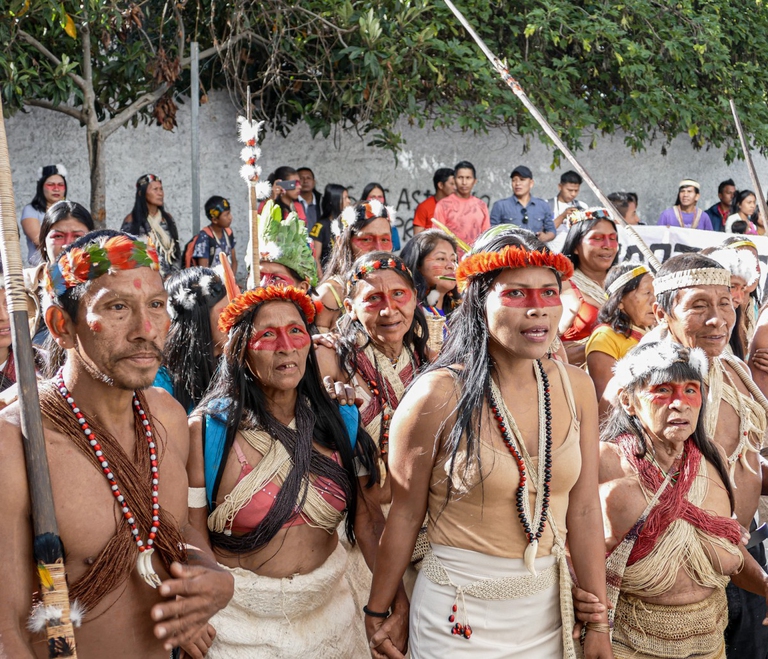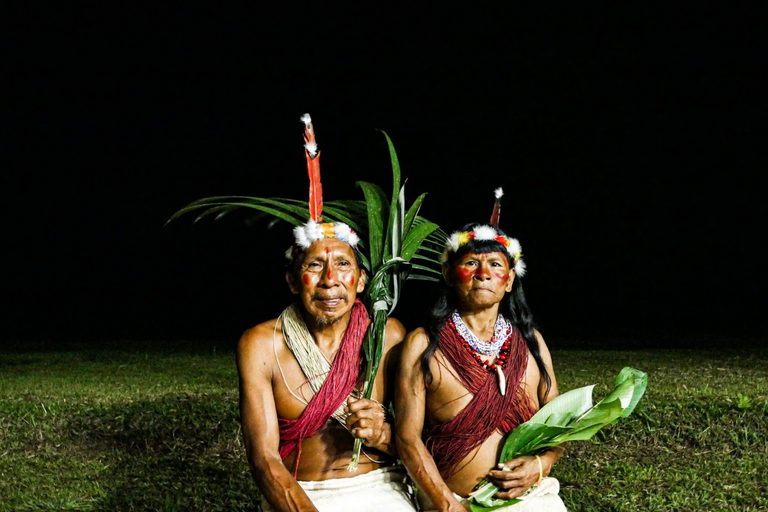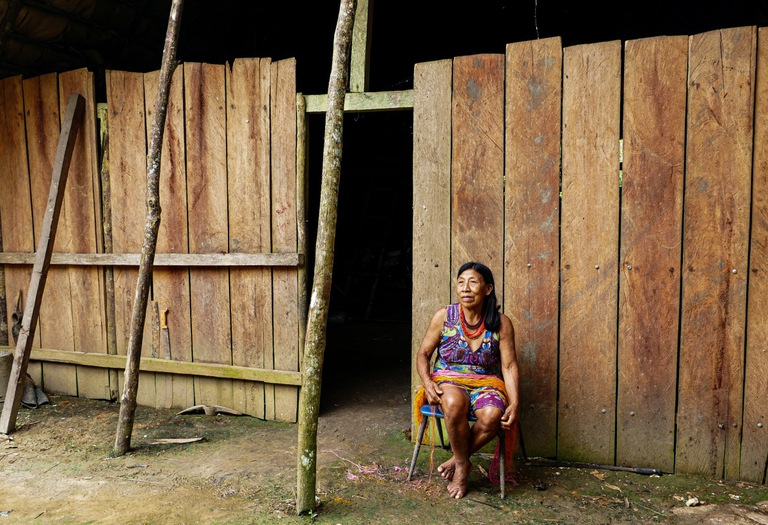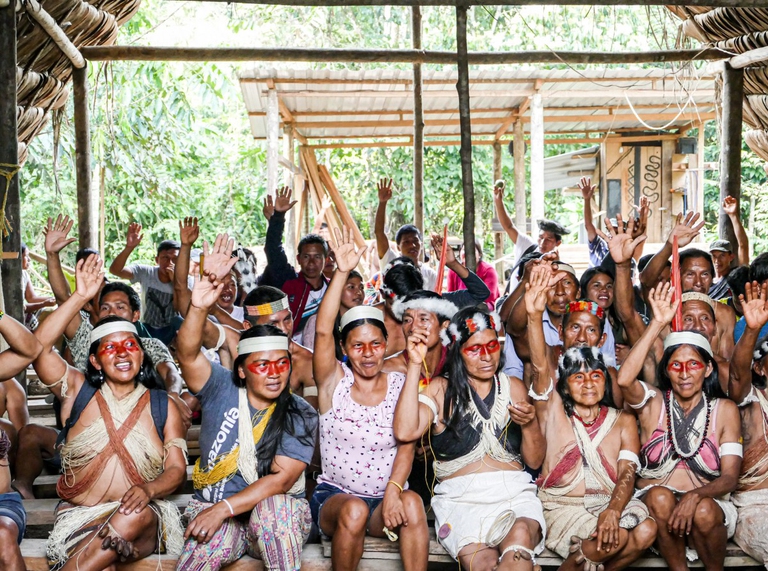
The second wave of the Covid-19 pandemic has shone a painful spotlight on the dire conditions of tea garden workers struggling against poverty in India.
Covid-19 could have dramatic consequences in the Ecuadorian Amazon. Abandoned by the government, the indigenous Waorani people are organising to combat the pandemic on their own.
Radio Jatari, a station for indigenous listeners in the Ecuadorian Amazon, has been broadcasting health-related messages for the past few weeks. The goal is to ensure that everyone, even people living in the forest’s most remote areas, has access to news about Covid-19.
“We spread information about the illness: its symptoms, how it’s transmitted and effective prevention measures,” Nemonte Nenquimo, President of CONCONAWEP (Coordinating Council of the Waorani Nationality of Ecuador-Pastaza) explains. Indigenous tribes translate this into their own languages and broadcast the messages on their respective frequencies”. The news is shared by other means as well, from WhatsApp to visual aids, with drawings circulating among villages.
Mobilisation isn’t limited to the forest. “We think it’s important to help all Waorani natives, even those who are now stuck in cities outside the territory,” Nenquimo continues. “We’re launching a fundraising drive, to ensure their basic needs – food, masks, soap – are met”.
Indeed, the plight against Covid-19 is taking place in the city as well as the forest. Access to native territories has been shut off to avoid the infection entering them. Many indigenous people are therefore stuck in urban centres. For those who mostly rely on hunting and fishing, who live in communities in which the cash economy is marginal, this means having to survive with no money for food or basic necessities, without the possibility of sustaining themselves as they would in the jungle.
The plight against Covid-19 is taking place in the city as well as the forest.
Even indigenous leaders have suspended their movements. Nenquimo is now in Shell, a municipality close to the city of Puyo, where many Waorani have built houses for when they have to travel to the city. From here, the activist is coordinating her people’s resistance to the pandemic.
Ecuador is one of the countries that is suffering the most due to the current emergency. Many families have been forced to keep the bodies of deceased relatives in their homes due to the national health system’s collapse. Images of corpses in the streets are circulating widely online; some bodies have even been set on fire. Guayaquil’s authorities have distributed cardboard coffins in an attempt to alleviate the situation. As of the 28th of of April, 23,240 cases and 663 deaths have been reported in the country. However, very few tests have been done, and the general inability to take on all cases suggests that numbers may be a lot higher: projections suggest 3,500 people could die in the coming weeks.
Read more: Ecuador, coronavirus hijacks healthcare as victims are left in their homes for days
The Ecuadorian people have been abandoned, and they’re dying in the streets. The Health Ministry is doing nothing to stop this. Institutions care even less about the forest, they just don’t respect it.Nemonte Nenquimo, Waorani leader
This critical situation is bringing Ecuador to its knees, and the most fragile groups are likely to pay the highest price. There are 16 recognised indigenous communities in the country, making up 7 per cent of the population. The first cases of Covid-19 affecting native inhabitants took place in Colombia, while in the US an outbreak in the Navajo Nation has also been a cause for great concern. The first indigenous death connected to the virus occurred in Brazil, in the Amazon. No such reports have emerged from in Ecuador, although the truth may be different.
“Indigenous communities in Ecuador are a step behind everyone else in the fight against the pandemic. Basic public services are often lacking in villages, and even where available, they’re poorly equipped to fight an epidemic. In certain communities, access to drinking water and sewage networks is completely lacking,” explains Alessia Marucci, who operates in Ecuador for Land is Life, an NGO working to defend indigenous rights.
“As UN reports highlight, illnesses like diabetes, tuberculosis, dengue and malnutrition are widespread in indigenous communities. This increases their vulnerability to the current situation”.
Indigenous communities in Ecuador are a step behind everyone else in the fight against the pandemic. Basic public services are often lacking in their villages, and even where available, they’re poorly equipped to fight an epidemic.Alessia Marucci, Land is Life
Ecuador’s government is doing very little, if anything, to protect indigenous peoples. Adequate protocols are lacking to protect them, so much so that the local WHO representative felt the need to intervene to prompt institutions to make headway in this sense.
In addition to this passive attitude, what increases the risk of contagion is the government green lighting extractive activities. The Waorani are among the most at-risk groups in this respect. They’re approximately 50,000 people spread across three Amazon provinces: Napo, Orellana and Pastaza. The first two have active oil wells, an issue that affects other communities in the region as well.
“In Ecuador there’s a large network of oil pipelines that goes from the Amazon to refineries on the coast. Extraction in the forest is still taking place now, with workers entering and leaving the territories without information about sanitary protocols implemented by companies being made available,” says Marucci.
“What’s more, three pipelines have ruptured in the past few days, with crude oil pouring into the Coca and Napo rivers. Water services have been cut off in two provinces right in the middle of a major health crisis, in which the first rule is respecting hygiene standards and washing one’s hands multiple times a day. The government keeps ignoring the issue, instead choosing to reassure markets that there’s enough oil for sales to continue”.
This is not the only time the extractive industry has become closely linked to the coronavirus pandemic. In March, Canada hosted an important convention for companies in this sector, and the Ecuadorian government allowed a delegation of five Shuar natives to accompany its representatives. Some of the meeting’s attendees have since tested positive for Covid-19, and there is concern that the indigenous delegates might have become infected and are now acting as carriers in the forest.
In fact, several members of indigenous communities have shown symptoms and been put under quarantine, but the government hasn’t sent any tests to these areas. Left to their own devices, native peoples are trying to organise and fight the virus on their own, guided by their leaders.
“Today, the feeling in our communities can be compared to when the first contacts with the outside world took place. Before then, there had practically never been major, destructive illnesses among the Waorani,” Nenquimo points out.
In 1957, evangelical missionaries from the Summer Institute of Linguistics in the US contacted the Waorani people by flying over their territory in planes and helicopters. In the following decade, they essentially forced them to live in a protectorate run by the mission – except for some clans who still live in isolation to this day. As a result, major polio, TB and measles epidemics decimated the population. These were traumatic events that the older generations haven’t forgotten, and that are coming back to mind now more than ever.
“My mother lived through that time, and she says this, now, could be just as bad,” Nenquimo continues. “If Covid-19 actually reaches our territories, there would be no way of controlling it and it could kill a lot of people. It’s a great worry for us leaders. This is why we’ve forbidden all entry to villages, and told those who have remained in the forest not to leave. For now, they’re safe there“.
If Covid-19 actually reaches our territories, there would be no way of controlling it and it could kill a lot of people.Nemonte Nenquimo, Waorani leader
The fear spreading through Waorani communities is focused mainly on the pikenani. They are the elders, the custodians of ancestral knowledge – and, as such, the true points of reference for the entire community. They also have unparalleled knowledge of the territory. And, as has emerged all over the world, people in older age groups are most at risk from the pandemic.
Due to the Ecuadorian government’s inaction, Waorani leaders and those of other native communities are raising their voices at the institutional level in the hope that their situation is addressed. The regional and national confederations uniting them release a daily bulletin outlining new cases which is translated into the languages of every group, and broadcast through all channels at their disposal.
Ecuador has a problem and native communities, more than anyone, are bringing this to the attention of national and international observers to protect themselves and the country more generally.Nemonte Nenquimo, Waorani leader
In addition to this, a full-fledged lobbying effort is underway to ask the government that indigenous representatives participate in emergency operations committees, among other things. Furthermore, a document has been submitted to the Inter-American Commission on Human Rights denouncing the government’s mismanagement of public health, the wasting of public funds and other irregularities. “Ecuador has a problem and native communities, more than anyone, are bringing this to the attention of national and international observers to protect themselves and the country more generally,” Nenquimo underlines.
“The Ecuadorian people have been abandoned and are dying in the streets. The Health Ministry is doing nothing to stop this. Institutions care even less about the forest, they just don’t respect it. I fear the government will continue ignoring us,” Nenquimo says.
“There’s a lot of talk about quarantine but economic interests are still being pursued. Mining and drilling in our territory are continuing, with all the associated contagion risks. The government sees only resources and money, but it doesn’t see life. We need to use our hearts and act without waiting for the government, because if we waste too much time we’re all going to die”.
We need to use our hearts and act without waiting for the government, because if we waste too much time we’re all going to die.Nemonte Nenquimo, indigena Waorani
Siamo anche su WhatsApp. Segui il canale ufficiale LifeGate per restare aggiornata, aggiornato sulle ultime notizie e sulle nostre attività.
![]()
Quest'opera è distribuita con Licenza Creative Commons Attribuzione - Non commerciale - Non opere derivate 4.0 Internazionale.
The second wave of the Covid-19 pandemic has shone a painful spotlight on the dire conditions of tea garden workers struggling against poverty in India.
A special report from the Yuqui territory delves deep into the dreams, challenges, joys and sadness of one of Bolivia’s most vulnerable indigenous groups.
In response to a lack of public services, organisations and individuals are helping citizens weather the devastating Covid-19 crisis in India.
The Yuqui people of the Bolivian Amazon fight not only to survive in the face of settlers, logging and Covid-19, but to preserve their culture and identity.
Jair Bolsonaro is accused of crimes against humanity for persecuting indigenous Brazilians and destroying the Amazon. We speak to William Bourdon and Charly Salkazanov, the lawyers bringing the case before the ICC.
A study indicates that the zoonotic origins of coronavirus may have been favoured by global warming’s impact on the conditions for bat habitats.
While Africa’s Covid-19 response has been praised by some, the pandemic has triggered the continent’s first recession in 25 years.
Activists hail the decision not to hold the 2023 World Anthropology Congress at a controversial Indian school for tribal children as originally planned.
In Coronation, a documentary filmed by the people of Wuhan, the dissident Chinese artist documents the government’s rigid control during lockdown.
